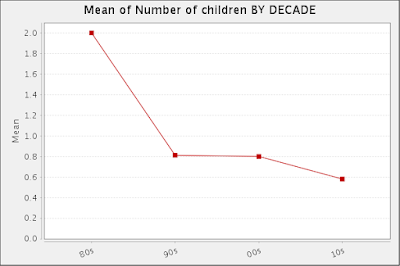The General Social Survey rated the skin darkness of a sample of black Americans, ranging from "very dark brown" to "very light brown." Biologically oriented researchers might see the question as a rough measure of the percentage of European ancestry, while sociologists would see it as a measure of discrimination--lighter-skinned blacks getting better treatment. Respondents were also given a job prestige score that ranges from 16 to 80--16 is a shoeshine and 80 is a physician. Here are the job prestige means listed by skin tone:
You can see that average job prestige tends to rise with lighter skin. The mean for blacks with "very light brown" skin is roughly two-thirds of a standard deviation higher than the mean for "very dark skin" blacks.
The pattern can be interpreted in at least two ways: 1) genetic--blacks with more European ancestry tend to rise in the status hierarchy much more than African blacks, or 2) sociological--whites discriminate more against darker blacks, and perhaps light-skinned blacks have white (privileged) relatives who gave them advantages.
For several reasons, I'm inclined toward the genetic explanation. For one, my experience is that when a white person is interacting with a black person, his thought is, "I'm talking with a black person," not, "I'm talking with a light-skinned black person." For another, how do those Nigerian immigrants do so well in the US when their skin tends to be so dark? The sociologist would predict severe discrimination. The biologist would argue that African immigrants are a select group of Africans--above average in IQ and drive--and this overwhelms any bias they might experience.








